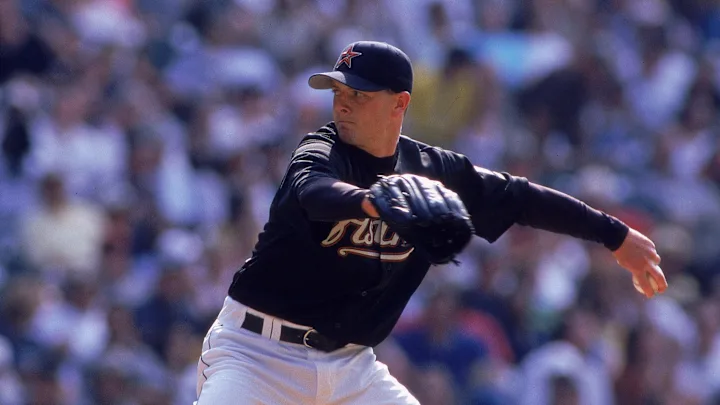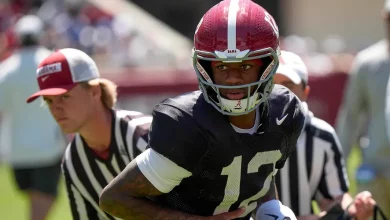Billy Wagner, a Houston Astros great, is a Hall of Fame voting tracker.

Billy Wagner is a name that resonates with fans of the Houston Astros and Major League Baseball (MLB) alike. As one of the most dominant relief pitchers in the history of the game, Wagner’s legacy has been solidified over his 16-year career, which featured a remarkable blend of speed, strikeouts, and closing ability. Yet, despite all his accomplishments, Wagner’s place in the Hall of Fame has remained a topic of discussion and debate since his retirement. As of the 2025 voting cycle, Wagner continues to be a candidate for induction into the Baseball Hall of Fame, and many have questioned whether his stellar career will finally earn him a spot in Cooperstown.
In this article, we’ll dive into Billy Wagner’s exceptional career, analyze the factors that have contributed to his Hall of Fame candidacy, and track the progress of his Hall of Fame voting status. We will also explore the arguments for and against Wagner’s induction, look at his standing in relation to other legendary closers, and examine the broader context of Hall of Fame voting as it pertains to relief pitchers in general.
Billy Wagner’s Career Overview
Before we delve into the Hall of Fame discussion, it’s essential to understand what made Billy Wagner such a special pitcher. Wagner was a left-handed reliever who played for several teams during his career, with the Houston Astros being the organization he is most closely associated with. Over his 16 seasons in Major League Baseball, Wagner became one of the most dominant closers in the game.
Career Stats (As of 2024):
- Games Played: 846
- Saves: 422
- ERA: 2.31
- Strikeouts: 1,196
- WHIP: 1.00
- All-Star Appearances: 7
Wagner’s fastball was one of the most feared pitches in the game. Consistently clocking in at over 100 mph, his blazing fastball, combined with a devastating slider, allowed him to overpower hitters. His career ERA of 2.31 ranks among the best for closers, and his 422 career saves place him in the top 10 all-time in that category. More impressive is his strikeout rate. Over his career, Wagner averaged 11.9 strikeouts per nine innings, which is exceptional for a relief pitcher and even more impressive for a left-hander. His strikeout rate was often among the best in baseball, and he frequently struck out the side in critical moments.
Billy Wagner’s dominance was not limited to one team or one era. While he began his career with the Astros, Wagner also had successful stints with the Philadelphia Phillies, New York Mets, and Atlanta Braves. His time with the Astros, however, was where he made his name and became one of the most beloved players in franchise history. As the Astros’ closer from 1995 to 2003, Wagner was a key figure in their competitive seasons throughout the late ’90s and early 2000s.
Hall of Fame Case: The Argument for Wagner
Billy Wagner’s case for the Hall of Fame is often discussed in the context of his historical performance and his dominance during his time in the game. Several factors play a role in the arguments for his induction into Cooperstown:
1. Elite Statistical Performance
When evaluating any Hall of Fame candidate, one of the first things voters and analysts look at are the player’s statistical accomplishments. Billy Wagner’s numbers stand up to scrutiny. His 422 career saves are an impressive feat and place him among an elite group of relievers. While Wagner may not have reached the 600-save mark that is often seen as the benchmark for elite closers, his dominance in other areas, such as ERA and strikeouts, strengthens his case.
Wagner’s career ERA of 2.31 ranks among the best for a closer. Many of the top closers in MLB history, such as Mariano Rivera (2.21), Trevor Hoffman (2.87), and Lee Smith (3.03), are also among the top relievers in terms of ERA, but Wagner’s 2.31 mark is one of the lowest. This suggests that Wagner’s effectiveness in shutting down opponents was far superior to that of many of his contemporaries.
Additionally, his strikeout rate of 11.9 strikeouts per nine innings is among the highest in MLB history for relievers. In a time when strikeouts are becoming more and more valued, Wagner’s ability to consistently miss bats and put away hitters has made him one of the most feared pitchers of his era.
2. Dominance in High-Leverage Situations
Hall of Fame voters often place a significant emphasis on a player’s ability to perform in high-pressure situations. Closers are often called upon to preserve wins in tight, late-game scenarios, and Wagner excelled in this area. Throughout his career, Wagner earned a reputation for coming through in critical moments, whether that meant closing out games in the regular season or in postseason action.
Though Wagner’s postseason appearances were limited, he made the most of them. He appeared in 20 postseason games and recorded 8 saves with a 1.80 ERA. His ability to pitch in high-leverage moments only enhances his Hall of Fame case. For a closer, it’s often less about accumulating long innings pitched and more about being able to consistently get outs when the game is on the line. Wagner proved time and again that he could do just that.
3. Longevity and Consistency
Another argument for Wagner’s Hall of Fame candidacy is his consistency over a 16-year career. Few relievers have been as effective for as long as Wagner was. From the time he became a full-time closer in the mid-1990s to his retirement in 2017, Wagner was a fixture in MLB bullpens. He was selected to seven All-Star teams, won the NL Rolaids Relief Man Award in 2003, and was consistently among the league leaders in saves and strikeouts.
What sets Wagner apart from other relievers is his ability to maintain high-level performance well into his 30s. Many pitchers begin to experience a decline in performance as they get older, but Wagner continued to thrive even in his later years. His longevity, combined with his peak performance, is a testament to his skill and dedication to the game.
4. Comparison to Other Hall of Fame Relievers
When considering any candidate for the Hall of Fame, it’s essential to place their career in context with others who have made it into Cooperstown. Wagner is often compared to other relief pitchers who have been inducted, including Mariano Rivera, Trevor Hoffman, and Rich Gossage. While Rivera is widely regarded as the greatest closer of all time, Wagner’s numbers compare favorably to other Hall of Fame relievers, especially in terms of ERA and strikeouts per inning.
For example, Wagner’s career strikeouts per nine innings (11.9) exceed those of both Rivera (8.2) and Hoffman (8.0). His ERA of 2.31 is also lower than that of Hoffman (2.87) and Gossage (3.01). These comparisons show that Wagner was at least as dominant, if not more so, than some of the closers who have been enshrined in Cooperstown. When looking at the totality of his career, Wagner’s numbers are undeniably Hall of Fame-caliber.
The Argument Against Wagner’s Hall of Fame Induction
While there are certainly strong arguments in favor of Billy Wagner’s induction into the Hall of Fame, there are also counterpoints that have caused some voters to hesitate. These arguments center primarily around the role of relief pitchers in general and Wagner’s standing relative to other great closers.
1. The Reliever Dilemma
Historically, relief pitchers have faced an uphill battle in terms of Hall of Fame voting. Despite the fact that some of the best pitchers in MLB history were closers, the Hall of Fame has been reluctant to induct many of them. This has been especially true for relief pitchers who did not have a long career as starters or those who were limited to one specific role—like closing games.
Mariano Rivera and Trevor Hoffman are two notable exceptions. Rivera’s 652 career saves, combined with his postseason dominance, made him a first-ballot inductee. Hoffman, with his 601 career saves and sustained excellence, eventually earned his spot after multiple years of voting. However, other excellent relievers like Lee Smith and Billy Wagner have faced more difficulty. Smith, for example, was not inducted until his 9th year of eligibility, while Wagner is still on the ballot and waiting for his moment.
2. Lack of a Signature Moment
Though Wagner was dominant for many years, one argument against his Hall of Fame candidacy is the lack of a single “signature moment” that would cement his legacy. While Mariano Rivera is remembered for his postseason success and Hoffman for his longevity, Wagner’s postseason appearances were limited, and his regular-season performances didn’t often come in the biggest of stages. Some critics argue that his inability to lead a team to a World Series or to consistently pitch in high-profile postseason games weakens his case compared to other Hall of Fame-caliber relievers.
The Voting Tracker
As of the 2025 Hall of Fame voting cycle, Billy Wagner continues to receive strong support from voters. In the 2024 voting cycle, Wagner received 68.1% of the vote, which was an increase from previous years and brought him closer to the 75% threshold needed for induction. Given the increasing recognition of relief pitchers’ value, it’s possible that Wagner could eventually break through and secure his place in Cooperstown.









